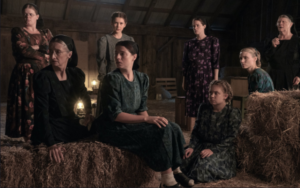WOMEN TALKING: 4 STARS. “emotional intelligence and powerhouse performances.”
 “Women Talking,” directed by Sarah Polley and now playing in theatres, is a very specific portrayal of the aftermath of sexual abuse, with a universal message of standing up for one’s self, family and community.
“Women Talking,” directed by Sarah Polley and now playing in theatres, is a very specific portrayal of the aftermath of sexual abuse, with a universal message of standing up for one’s self, family and community.
Based on a 2018 Miriam Toews novel of the same name, in the film, the women of a tightly knit religious colony gather in the wake of terrible, on-going sexual abuse by the men. For years the commune’s husbands and sons have tranquilized the women with cow medication, raped them regardless of age, and then convinced the victims the abuse was the work of Satan or their “wild imaginations.”
“We know that we’ve not imagined these attacks,” says Salome (Claire Foy), the mother of an abused child. “We know that we are bruised, and infected, and pregnant, and terrified.”
In the wake of the allegations, the men, sequestered in the city for their safe keeping, have given the women two days to forgive them. If they don’t, they threaten to expel from the community women which means they will be denied entry into the Kingdom of Heaven.
“Surely,” says mother-to-be Ona (Rooney Mara), “there must be something worth living for in this life. Not only the next.”
Now, gathered in the hayloft of one of their barns, the women, including the rancorous Mariche (Jessie Buckley) and community matriarch Agata (Judith Ivey), debate their three options: do nothing in retaliation, stay and fight, or leave.
The spirited deliberations give way to a variety of points of view. “Is forgiveness that’s forced upon us true forgiveness?” wonders Mariche. “We have been preyed upon like animals,” says Greta (Sheila McCarthy). “Maybe we should respond like animals.” Others wonder what life would have been like if none of this ever happened.
Set in 2010, timely social issues of justice, autonomy and unanimity among victims collide in a movie that captures the extended conversations, highlighting their harrowing nature, while slyly mixing in some unexpected humour.
Polley, who wrote as well as directed, ensures that each of the characters bring dynamic notions to their performances, and aren’t just placeholders representing opposing ideas for the sake of drama. The set-up, based on true events in a religious community in Boliva, offers a fascinating window into a fight for survival and the opportunity to examine the situation from a variety of thoughtful viewpoints.
A film, largely set in one room, whose action is verbal, not physical, could have been dry or, at the least, feel stage bound but Polley’s deep dive into the human condition crackles with life. She has carefully calibrated every line, every pause, to create forward momentum as the life-changing deliberations move toward their conclusion.
“Women Talking” is elegant filmmaking buoyed by emotional intelligence and powerhouse performances and is sure to be Oscar bound.
